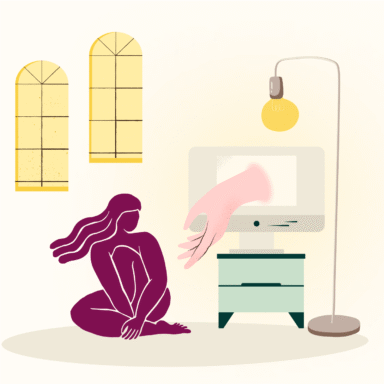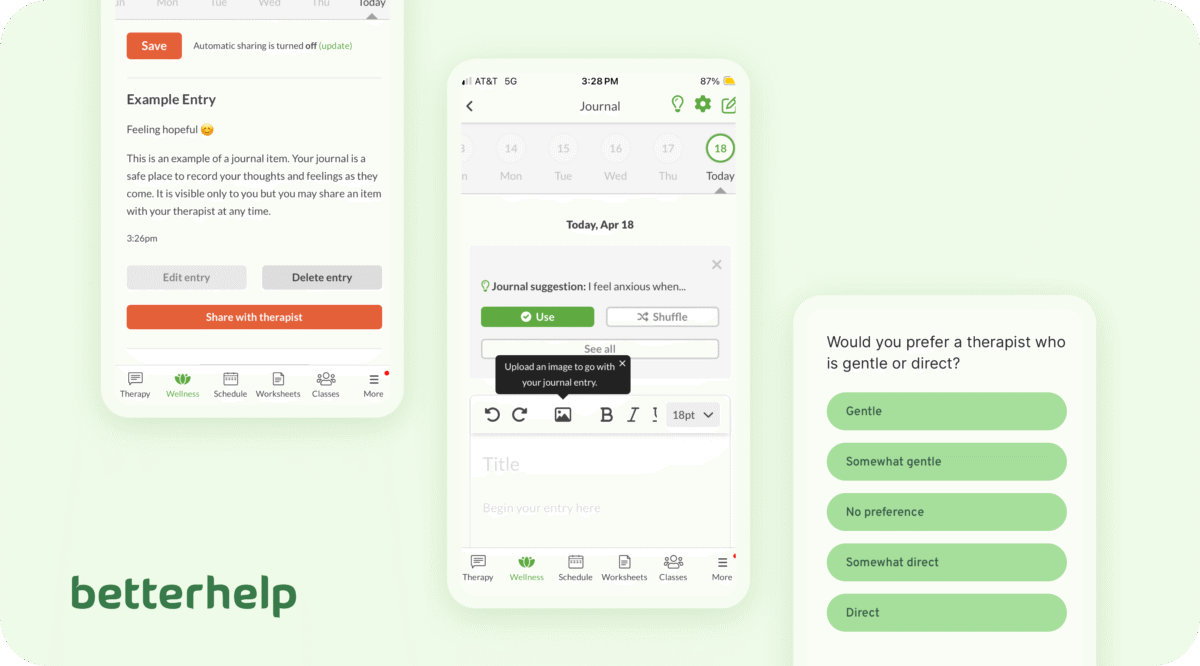

This therapist directory is offered in partnership with BetterHelp. If you sign up for therapy after clicking through from this site, HelpGuide will earn a commission. This helps us continue our nonprofit mission and continue to be there as a free mental health resource for everyone.
Need to talk to someone now? Find a crisis helpline
If you're a BetterHelp therapist with questions about your directory listing, please contact therapists@betterhelp.com
The HelpGuide team personally tested out BetterHelp and surveyed other users to get an inside look into the platform’s strengths and weaknesses. Here’s what we discovered about BetterHelp’s usability, therapist quality, value, and more.

The HelpGuide team personally tested out BetterHelp and surveyed other users to get an inside look into the platform’s strengths and weaknesses. Here’s what we discovered about BetterHelp’s usability, therapist quality, value, and more.

We independently test and review all of the services we recommend. When you sign up through our links, we may earn a commission, which helps support our nonprofit mission.
BetterHelp is one of the most popular online therapy platforms. It’s also the largest—with more than 30,000 licensed therapists in its network. It’s available in all 50 states in the U.S. and in many other countries, including Canada, the UK, Australia, and India.
Two members of the HelpGuide staff separately tested BetterHelp for a month and took detailed notes about their experiences. We also surveyed over 100 BetterHelp users and asked them to rate different aspects of the service and share their feedback.
Overall, we found that most users were satisfied with their experience with BetterHelp. In fact, 86 percent said they’d use the therapy platform again in the future. The service’s wide selection of mental health professionals made it stand out from similar online therapy platforms. Although customer support could’ve been more responsive, BetterHelp’s interface is very user-friendly. The service doesn’t accept insurance, which can be a significant drawback for some. However, most users found the price was worth the experience, and many were also able to access the platform’s financial aid, increasing affordability.
Two HelpGuide staff members tested BetterHelp, using the platform for a month and produced detailed reports of their experiences. They each went through the sign-up process, scheduled and attended multiple therapy sessions, contacted customer support, and switched therapists. They also tried out the platform’s extra features, such as between-session messaging and goal tracking tools. Each tester kept weekly journals throughout the whole process and documented their findings in detail.
In addition, we surveyed 100 BetterHelp users to get a greater understanding of the platform’s strengths and weaknesses. These users completed extensive questionnaires, allowing us to collect their opinions on platform usability, pricing, privacy concerns, therapist quality, and overall satisfaction. With all this information on hand, we were able to gain insight into how BetterHelp serves its users and compare the platform to similar online therapy apps.
Our staff testers had a positive experience with BetterHelp’s onboarding process. One tester reported that the process took more than 15 minutes, but thought the thoroughness of the questionnaire resulted in great therapist matches. He was scheduled for a first session within 24 hours. BetterHelp did an excellent job in guiding the tester through the onboarding process, always offering information on what to do and expect next.
77 percent of survey respondents completed the sign-up process within 10 to 20 minutes. The vast majority agreed that the onboarding questionnaire was easy or very easy; however, around a third of users wanted it to be shorter, have clearer questions, and be given the option to skip or revisit questions. 35 percent of users wanted more information about therapist qualifications upfront, and 39 percent wanted more immediate information about pricing.
Our staff testers found the platform intuitive to use and navigate, even though one of them was completely new to the online therapy experience. Technical issues only appeared when a tester tried out the live chat messaging feature for one of his therapy sessions. The issues were easily resolved, but the tester noted that the phone and video call sessions were much smoother options.
After sign-up, survey respondents largely enjoyed the user-friendly interface. The majority of respondents thought the platform was either easy (41 percent) or very easy (47 percent) to navigate. 68 percent of users reported experiencing no technical disruptions whatsoever. When technical issues did arise, they were usually related to video quality or session connection.
When it came to platform security and privacy, many users put their trust in the platform. When asked how confident they were that BetterHelp would protect their personal info during sign-up, 83 percent said they were confident or very confident. Respondents gave similar ratings when asked if their conversations with therapists felt secure and private.
That said, it’s important to review BetterHelp’s privacy policy for yourself and decide if you’re comfortable with it. One of our testers noted the policy is easy to find at the bottom of pages in both the app and desktop versions of BetterHelp.
The therapists on BetterHelp received largely positive reviews from users. When asked to rate their therapist’s level of empathy and understanding on a scale of one to five, 80 percent of user respondents rated their therapist either a four or a five. 90 percent of users rated their overall therapist experience as good or very good. “I love what my therapist has done for me. It has worked wonders for me,” one respondent commented.
BetterHelp therapy sessions typically last 30 to 45 minutes. According to our survey data, most therapists (64 percent) offered a mix of casual and structured sessions. Although therapists used a variety of techniques and approaches, survey respondents reported cognitive behavioral therapy (CBT) and mindfulness to be among the most common.
Sometimes, the therapists use the platform’s other tools to supplement the sessions. For instance, one of our testers was assigned homework that involved making “worry appointments”—setting aside blocks of time specifically for journaling worries. An in-app tracker allowed him to monitor his progress with this exercise. However, he found this to be such a useful practice that he continued to do it even after his BetterHelp subscription ended.
Between sessions, BetterHelp allows for unlimited texting between the user and their therapist. The testers found that their providers were responsive between sessions, and one even took the time to explain which days were best to reach her. Of course, each therapist will likely have different response times and messaging habits. So, it’s always best to talk to your provider about what to expect when it comes to between-session communication.
86 percent of survey respondents said they were satisfied or very satisfied with the first therapist they were matched with. Only 22 percent found it necessary to switch therapists.
Our testers were similarly satisfied with their first matches. However, they still went through the process of switching to see how it worked. Changing your provider on BetterHelp is quick and easy. When switching, you’re presented with a list of 10 new therapists who match your preferences. One tester wished that he had been initially given this list of therapists, rather than being auto-matched to one. However, other users might appreciate how BetterHelp’s auto-matching feature streamlines the process of getting started with therapy.
BetterHelp pricing ranges from $65 to $100 per week. The service operates on a subscription model, meaning you’ll be billed somewhere between $260 and $400 monthly. Most users have one therapy session per week, but it’s possible to pay for additional sessions depending on your needs and your therapist’s availability.
For comparison, the out-of-pocket cost of therapy in the U.S. is typically between $100 and $200 per session. For one therapy session a week, this would add up to between $400 and $800 a month, likely higher than the cost of using BetterHelp.
BetterHelp’s price range is similar to some of its competitors. For instance, for users who are paying out of pocket, Talkspace’s starting price ranges between $69 and $109 per week ($276 to $436 a month).
Note that BetterHelp doesn’t currently accept insurance. This can be a major drawback, since many people rely on insurance to bring down the cost of both in-person and online therapy sessions. However, BetterHelp does offer discounts. For instance, a quarter of our survey respondents—as well as our hands-on testers—benefited from discounted pricing or the service’s financial aid. For one of our testers, HelpGuide’s discount code reduced the price from $90 a week to $72.
When asked to rate the value of the service in relation to its cost, 74 percent of survey respondents gave BetterHelp either a 4 or 5 out of 5. 80 percent said they didn’t encounter any surprise charges, which shows that the service was largely transparent about its pricing model.
Here are a few areas in which BetterHelp really stood out from its competitors.
No online therapy platform is perfect. Based on our survey results and testers’ experiences, BetterHelp could improve in the following areas.
If you’re hoping to use insurance to cover therapy, BetterHelp may not be for you. That point aside, BetterHelp will be an excellent option for many people seeking online therapy. Its user-friendly design makes it suitable for anyone trying out online therapy for the first time.
Meanwhile, its wide network of providers makes it useful for people who have had a difficult time finding the right therapist, either in-person or through other therapy apps. The therapists also specialize in a diverse range of mental health approaches, including CBT, solution-focused brief therapy, mindfulness, and acceptance and commitment therapy (ACT). This makes BetterHelp a wise choice for anyone hoping to explore different mental health tools and therapy approaches.
We’d love to hear from you! Your feedback helps us improve and make sure you’re finding the support and information you need.
Millions of readers rely on HelpGuide.org for free, evidence-based resources to understand and navigate mental health challenges. Please donate today to help us save, support, and change lives.
Donate to HelpGuide.org today